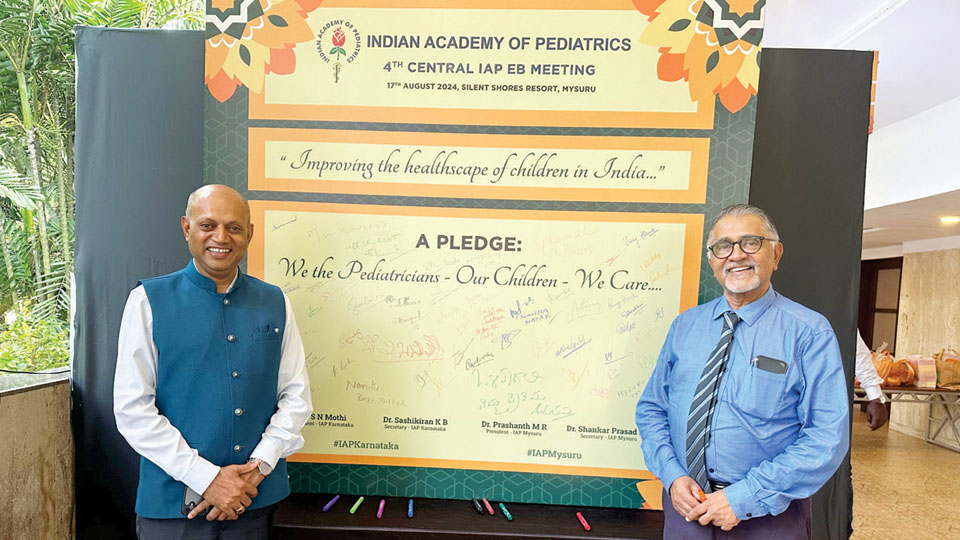The Indian Academy of Paediatrics (IAP) is the association of paediatricians in India, dedicated to enhancing child health services. Towards its mission to provide quality and affordable healthcare to children (0 -18 years) in India, IAP has adopted 14 trainee modules to upskill its paediatricians. It currently has 47,000 paediatricians from all over the country, 32 State branches, 376 city branches and 30 sub-specialities. Karnataka has around 5,000 paediatricians.
Aligning with its new tag line IAP Ki Baat, Community Ke Sath, IAP trains paediatricians to work along with local communities. On behalf of Star of Mysore, Sujata Rajpal caught up with Dr. G.V. Basavaraja, National President, IAP-2024 who was in Mysuru recently for the 4th Central IAP meeting and its knowledge sharing initiative where 120 medical professionals from all over India participated in the two-day training on latest developments and practices in child healthcare.
Since its inception in 1963, this is the third time a paediatrician from Karnataka has taken the helm of this organisation which also functions as an advisory body to government in robust policy making towards child healthcare and work along with WHO and UNICEF.
Dr. Basavaraja is the recipient of many awards for his contribution to the field of medicine and paediatric care. To name a few, B.C. Roy award, Eminent Doctor personality award 2024 conferred by Indian Medical Association.
In the free-wheeling interview, Dr. Basavaraja (Professor of Paediatrics at Indira Gandhi Institute of Child Health, Bengaluru) talks about the role of IAP, the new initiatives in improving child health services in India and the widely spreading dengue. Excerpts:
By Sujata Rajpal
Star of Mysore (SOM): What is the most important concern in child health in India?
Dr. G.V. Basavaraja: Anaemia, especially in female children, is a major health concern. In India, 65% adolescents are anaemic which leads to low height and weight, poor immunity, child bearing complication in girl children, low birth weight etc. To address anaemia in children, IAP has adopted a three pronged approach of awareness, community reach and treatment.
Anaemia can be prevented with a nutritious diet rich in iron, calcium and proteins. IAP collaborates with the government to include nutritious diet in midday meals.
Our paediatricians visit anganwadis, schools, slums and destitute homes to raise awareness about nutrition and provide clinical examination for early detection and treatment.
SOM: Obesity in children is another important issue. How to address this early?
Dr. Basavaraja: Poor nutrition in lower economic strata and obesity in middle and upper strata are both serious concerns. By 2035, 45% of our population is expected to be obese. Consuming unhealthy and junk food contributes to poor nutrition and obesity, increasing the risk of diabetes and heart disease.
SOM: In recent years, dengue has increasingly posed a serious health threat, with its impact ranging from severe illness to fatalities. What are the steps taken by IAP towards the prevention of dengue and its treatment?
Dr. Basavaraja: Dengue, Chikungunya and Zika fever are viral diseases transmitted to humans and animals through the bite of infected mosquitoes which typically belong to the Aedes species. Dengue, which occurs mainly in monsoon, spreads wildly but locally because the infected mosquito doesn’t bite just one person, it bites hundreds and thousands at one point of time; so if there are dengue cases in your area, be on high alert, and take immediate preventive measures — such as wear proper clothing so that exposure to skin is minimum, avoid stagnant water in AC and coolers, use of mosquito repellent, nets etc. In case of any symptoms, the patient should consult a physician immediately. During treatment, it is crucial to monitor the Blood Pressure (BP). Dengue is curable, but it becomes fatal if it is not treated immediately.
Shortly, IAP will launch Dengue prevention, diagnose and treatment programme with actionable items for creating awareness on its prevention and treatment.
SOM: What are the community involvement initiatives by IAP?
Dr. Basavaraja: Teaching cardiopulmonary resuscitation (CPR) to general public is another of our community welfare initiatives. Unlike in Western countries, where most people can perform CPR, only 2% of Indians know how to do it. The first three minutes during a heart attack are crucial; after this time, brain damage can become irreversible. CPR can be performed by a layperson with minimal training. We aim to train security staff, drivers, nurses, lab technicians, Police, and the general public. So far, we have trained 42,000 people through our volunteers. In neonatal care, CPR may be needed for new-borns and we are also training our nursing staff for this purpose.








Recent Comments